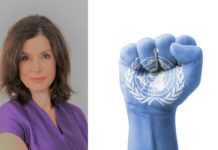MDMA Assisted Psychotherapy and Therapeutic Humility: An Interview with Marcela Ot’alora
Richard Sears interviews Marcella Ot’alora, therapist and principal investigator for MAPS MDMA-assisted psychotherapy.
When Healing Looks Like Justice: An Interview with Harvard Psychologist Joseph Gone
MIA’s Ayurdhi Dhar interviews Joseph Gone about how a history of dispossession, conquest, and colonization shapes mental health outcomes in Native American communities.
Multiplicity and Mad Studies: An Interview with Jazmine Russell
In this interview, Jazmine Russell describes her journey through psychosis and mental health advocacy to embracing a multiplicity of frameworks in Mad Studies.
Fascist Subjectivity and the Subhuman: An Interview with Critical Psychologist Thomas Teo
MIA's Tim Beck interviews critical psychologist Thomas Teo on how theory and research can do justice to the people it means to describe and explain.
Psychology, Personhood, and the Crisis of Neoliberalism: Jeff Sugarman on Theoretical and Critical Psychology
Tim Beck interviews Jeff Sugarman on the psychology of personhood, the influence of neoliberalism on mental health, and the need for a more philosophically informed psychology.
Can Critiques of Psychiatry Help us Imagine a Post-Capitalist Future? An Interview with Hans...
An interview with Hans Skott-Myhre on the seeds of post-capitalist subjectivity to be found in the writing of Franco Basaglia and R.D. Laing.
Global Mental Health – The Hypocrisy of Mental Health in The Age of Austerity
Dr. China Mills shares her reactions to recent events focused on Global Mental Health, elaborating on deeper issues with the framing of mental health as a “burden” and the underlying implications of coloniality, technology, and medicalization.
Questioning the Moral Panic Around Teletherapy: An Interview with Hannah Zeavin
MIA's Emaline Friedman interviews Hannah Zeavin about what the history of teletherapy reveals about its limitations and radical potential.
Psychology’s Small Stories and the Call of the Other: An Interview with David Goodman
Ayurdhi Dhar interviews David Goodman about his vision for a psychology grounded in care for the other, the risks of psychotherapeutic standardization, and why humility—and even embarrassment—may be vital to human flourishing.
Bringing Human Rights to Mental Health Care: An Interview with UN Envoy Dainius Pūras
MIA's Ana Florence interviews United Nations Special Rapporteur Dainius Pūras about his own journey as a psychiatrist and the future of rights-based approaches to mental health.
Mad Science, Psychiatric Coercion and the Therapeutic State: An Interview with Dr. David Cohen
MIA's Peter Simons interviews David Cohen, PhD, on his path to researching mental health, coercive practices, and discontinuation from psychiatric drugs.
Learning a Different Way: An Interview with Maori Psychiatrist Diana Kopua
MIA’s Ayurdhi Dhar interviews Diana Kopua about the Mahi a Atua approach, the global mental health movement, and the importance of language and narratives in how we understand our world and ease our suffering.
Peer-Support Groups Were Right, Guidelines Were Wrong: Dr. Mark Horowitz on Tapering Off Antidepressants
In an interview with MIA, Dr. Horowitz discusses his recent article on why tapering off antidepressants can take months or even years.
Psychology is Not What You Think: An Interview with Critical Psychologist Ian Parker
MIA’s Ayurdhi Dhar interviews Ian Parker about critical psychology, discourse and political action, and whether psychology has anything left to offer.
Bringing Integrative Community Therapy to Pittsburgh: An Interview with Alice and Kenneth Thompson
Father and daughter Ken and Alice Thompson run the Visible Hands Collaborative, bringing Integrative Community Therapy to the US.
Constructing Alternatives to the DSM: An Interview with Dr. Jonathan Raskin
Dr. Raskin discusses psychotherapists’ dissatisfaction with current psychiatric diagnostic systems and explores alternatives.
“I Found My Lion’s Roar”: Ro Speight on Combining Peer Support and Open Dialogue
MIA's Ana Florence interviews recovery advocate Ro Speight about her journey from receiving Peer Support to working as a facilitator in Peer Partnered Open Dialogue.
The Poetics and Politics of Our Mental Health Metaphors: An Interview with Laurence Kirmayer
Ayurdhi Dhar interviews influential cultural psychiatrist Laurence Kirmayer on how metaphors, histories, and social structures contour our experiences of suffering and healing.
Addressing the Roots of Racial Trauma: An Interview with Psychologist Lillian Comas-Díaz
MIA’s Hannah Emerson interviews Comas-Díaz on the need for culturally competent care in a medicalized and individualistic society.
Toward a Critical Self-Reflective Psychiatry: An Interview with Pat Bracken
MIA’s Justin Karter interviews critical psychiatrist and philosopher Pat Bracken about the necessity of challenging received wisdom.
“Making a Silk Purse Out of a Sow’s Ear”: Erick Turner on How Publication...
Ayurdhi Dhar interviews Erick Turner about publication bias in antidepressant trials, compromised psychotherapeutic research, and a culture of journal worship.
Beyond Paternalism or Abandonment in Mental Health Care: An Interview with Neil Gong
Neil Gong exposes the false choice in mental health policy between tolerant containment for the poor and paternalistic surveillance for the rich.
From Freud to Fanon: How Daniel Gaztambide is Redefining Psychoanalytic Practice
In this interview, Daniel Gaztambide discusses how decolonial perspectives can transform psychoanalytic practice.
WHO and the Sea Change in Mental Health: Interview with Michelle Funk
MIA's Ana Florence interviews Michelle Funk about her leadership of the new WHO guidelines on rights-based mental health.
Undisclosed Financial Conflicts of Interest in the DSM-5: An Interview with Lisa Cosgrove and...
On the Mad in America podcast we talk with Lisa Cosgrove and Brian Piper about their BMJ paper entitled "Undisclosed Financial Conflicts of Interest in the DSM-5 TR: Cross-Sectional Analysis"

































